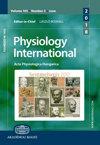慢性血液透析患者的促炎因子、抗炎因子、血管僵硬度和预后。
IF 2.2
4区 医学
Q3 PHYSIOLOGY
引用次数: 8
摘要
目的:在这项观察性研究中,我们通过测量血管硬度(VS)参数来研究血液透析(HD)慢性肾衰竭(CRF)患者的加速动脉硬化(AS),并试图将其与促炎和保护因素联系起来。患者:纳入96例连续接受常规HD治疗的患者。20名无重大肾脏、心血管或代谢疾病的成年患者作为对照组。方法:采用压平式血压计(sphygmoor, AtCor Medical, Sidney)测量AS参数(颈股脉波速度- PWV,主动脉增强指数- Aix)。在常规实验室检测的基础上,采用免疫测定法定量25(OH)、维生素D3(维生素D3)和高敏c反应蛋白(hsCRP);ELISA法检测胎儿素a、α-Klotho、肿瘤坏死因子-α (TNF-α)、转化生长因子-β1 (TGF-β1)含量。结果:HD患者促炎标志物hsCRP、TNF-α、TGF-β1显著升高(P < 0.01),抗炎因子fetuin-A、α-Klotho、维生素D3显著降低(P < 0.01)。PWV仅受总胆固醇、胎儿素a和透析时间的显著影响。多元线性回归分析显示,一些临床和实验室参数与抗炎和抗炎生物标志物相关,而不是VS.基线临床和生化变量对结果测量的影响也在3年随访后进行了分析,结果表明低水平的维生素D、α-Klotho蛋白和胎蛋白a与不良心血管结局有关。结论:我们的研究结果为CRF患者加速AS的病理机制提供了额外的信息,并记录了促炎和抗炎生物标志物对主要结局指标的直接影响。本文章由计算机程序翻译,如有差异,请以英文原文为准。
Pro- and anti-inflammatory factors, vascular stiffness and outcomes in chronic hemodialysis patients.
Objective In this observational study we addressed accelerated arteriosclerosis (AS) in patients with chronic renal failure (CRF) on hemodialysis (HD) by measuring vascular stiffness (VS) parameters and attempted to relate them to pro-inflammatory and protective factors. Patients 96 consecutive patients receiving regular HD were included. 20 adult patients without major renal, cardiovascular or metabolic morbidities served as controls. Methods AS parameters (carotid-femoral pulse wave velocity - PWV, aortic augmentation index - Aix) were measured by using applanation tonometry (SphygmoCor, AtCor Medical, Sidney). In addition to routine laboratory tests 25(OH) vitamin D3 (vitamin D3) and high-sensitivity C-reactive protein (hsCRP) were quantified by immunometric assay; whereas fetuin-A, α-Klotho, tumor necrosis factor-α (TNF-α) and transforming growth factor-β1 (TGF-β1) were determined by ELISA. Results Pro-inflammatory biomarkers (hsCRP, TNF-α and TGF-β1) were markedly elevated (P < 0.01), while anti-inflammatory factors (fetuin-A: P < 0.05, α-Klotho: P < 0.01, vitamin D3: P < 0.01) significantly depressed in HD patients when compared to controls. PWV was significantly affected only by total cholesterol, fetuin-A and dialysis time. Multiple linear regression analyses revealed that several clinical and laboratory parameters were associated with pro- and anti-inflammatory biomarkers rather than VS. The impact of baseline clinical and biochemical variables on outcome measures were also analyzed after three-year follow-up, and it was demonstrated that low levels of vitamin D, α-Klotho protein and fetuin-A were related to adverse cardiovascular outcomes, whereas all-cause mortality was associated with elevated hsCRP and depressed vitamin D. Conclusions Our results provide additional information on the pathomechanism of accelerated AS in patients with CRF, and documented direct influence of pro- and anti-inflammatory biomarkers on major outcome measures.
求助全文
通过发布文献求助,成功后即可免费获取论文全文。
去求助
来源期刊

Physiology international
Medicine-Physiology (medical)
CiteScore
3.40
自引率
0.00%
发文量
37
期刊介绍:
The journal provides a forum for important new research papers written by eminent scientists on experimental medical sciences. Papers reporting on both original work and review articles in the fields of basic and clinical physiology, pathophysiology (from the subcellular organization level up to the oranizmic one), as well as related disciplines, including history of physiological sciences, are accepted.
 求助内容:
求助内容: 应助结果提醒方式:
应助结果提醒方式:


